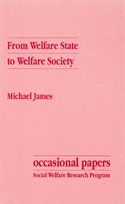
The legitimacy of the welfare state has survived the shift in recent years towards smaller government and a greater role for individual initiative and enterprise in the economy. Michael James argues that the prestige of the welfare state stems from the widespread conviction that it embodies the community’s compassion and so is morally superior to the private and individual sphere, which is allegedly motivated by selfishness.
Breaking the intellectual spell of the welfare state involves recognising that politics is motivated largely by selfishness and that, conversely, much individual activity is motivated by altruism. More fundamentally, focusing on citizens’ welfare preferences rather than their motives clarifies the potential role of the private sector in meeting welfare needs. In a free society, there is no place for government monopoly in service provision or even in defining ‘social problems’. Rather, individual citizens should be free to devote their resources to promoting their own and one another’s welfare in the light of their own judgements and preferences.











